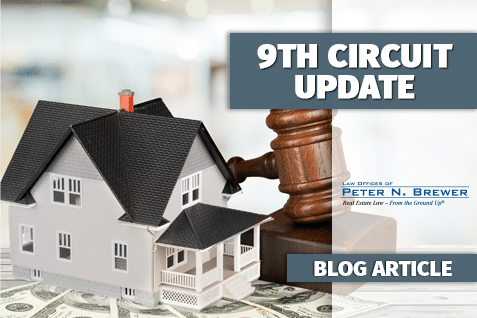Robert and Darlene Blendheim (“Blendheim”) were borrowers who obtained two mortgages from HSBC Mortgages Services in the amounts of $347,900 and $90,474. In 2007, the Blendheims filed for Chapter 7 bankruptcy protection and obtained their discharge. The day after receiving their discharge, they filed for Chapter 13 bankruptcy protection in order to restructure their debts. Primarily, they were focused on the two loans secured against their home. In the second bankruptcy, HSBC filed a proof of claim for the first mortgage. The Blendheims challenged the claim and HSBC did not respond. Accordingly, the bankruptcy court issued an order disallowing HSBC’s claim. Strangely, after being served with the order, HSBC did not object to the order, but instead requested not to be further notified about the bankruptcy proceeding. After the order, the Blendheims moved to void the lien secured against the property as the underlying claim had been disallowed by the bankruptcy court. Over the opposition of HSBC, the bankruptcy court agreed with the Blendheims and ordered that the lien would be cancelled at the completion of the bankruptcy. While the Court noted that it was hesitant to cancel the lien, which essentially would prevent HSBC from foreclosing or otherwise collecting on the loan, it noted that the statute required this conclusion. As part of the second bankruptcy, the Blendheims submitted plans to reorganize their debt. HSBC challenged those plans stating that the Blendheims’ plan should provide that HSBC’s first lien would be reinstated at the completion of the plan arguing that bankruptcy law does not allow a permanent cancellation of the lien if the debtors do not obtain a discharge. The bankruptcy court disagreed and eventually confirmed a plan. HSBC then appealed to the district court.
At the district court level, the Court affirmed all of the bankruptcy court’s orders. First, it noted that HSBC was untimely on its appeal of the order denying HSBC’s proof of claim and on the order voiding the lien. Second, the Court found that a debtor can permanently avoid a lien even if the debtor is not entitled to a discharge. It noted that it would be a harsh result if a debtor faithfully performed all of the debtor’s obligations under the plan to just see the debtor’s debts “spring back to life.” HSBC once again appealed to the Ninth Circuit Court of Appeals.
THE DECISION:
The United States Court of Appeals for the Ninth Circuit affirmed the district court and bankruptcy court’s ruling and held that HSBC’s first mortgage had been correctly voided and that the Blendheims could permanently void the lien. The Court held that while there had been previous cases where a lien was not voided because the creditor had failed to timely file a proof of claim, those cases were not relevant because the statute explicitly provides that a lien cannot be voided because a creditor did not file a proof of claim. Here, HSBC filed a proof of claim and it was successfully objected to by the Blendheims. Since HSBC had timely filed the claim, the exemption did not apply.
Further, the Court found that the lien could be permanently stripped even if the Blendheims were not eligible for a discharge in the Chapter 13 bankruptcy. The Court clarified that there were four different ways for a Chapter 13 bankruptcy to be resolved: a conversion to a different type of bankruptcy, a dismissal of the case, the issuance of a discharge for the debtor, or the closing of a bankruptcy case. Previously, the appellate court had implied that the only successful way to conclude a Chapter 13 bankruptcy matter was for a discharge to be issued. However, the Court held that a Chapter 13 bankruptcy could be successfully concluded by a debtor successfully completing an approved plan even if no discharge is granted. As a discharge is not required for a bankruptcy to be successfully concluded, a debtor did not need to be eligible for a discharge to permanently void a lien.
WHY THIS DECISION IS IMPORTANT:
The Court has given its approval for “Chapter 20” bankruptcies. A Chapter 20 bankruptcy is where a debtor first files for a Chapter 7 bankruptcy to obtain a discharge and then follows with a Chapter 13 bankruptcy, generally to strip liens off of underwater properties. The reason that debtors had been filing Chapter 20s is because a debtor was not allowed to perform strip liens off their primary residence in a Chapter 7 or reorganize their debts in order to catch up. While there previously had been concerns that a Chapter 20 was de facto bad faith and would not be permitted, this decision indicates that courts have given their blessings for debtors to pursue a Chapter 20.
COMMENT:
HSBC’s actions in this case were largely inexplicable. No good reason was ever provided by HSBC for their failure to take appropriate action in protecting the first mortgage. Given HSBC’s negligence, it was unsurprising that the courts had little sympathy for HSBC’s position. Further, by clarifying the legality of Chapter 20s, the court has provided debtors with new tools on managing and reorganizing their debts.
HSBC Bank USA, N.A. v. Blendheim, 803 F.3d 477 (9th Cir. 2015)





